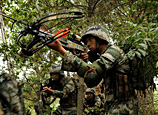
What the country lacks is follow-up procedures, experts said.
“We already have a sound urgent-response system to occupational exposure,” said Sun Xinhua, deputy inspector for the Ministry of Health’s disease prevention and control bureau, at a news conference on Wednesday.
“However, we need to improve the management that comes after emergency treatment, such as how to assess the harm of the exposure and how to compensate for that, in order to give medical workers more security.”
The compensation policy would also need to cover the side effects of the preventive medicines people who are exposed to HIV at work must take.
“Symptoms can include headaches, fevers, nausea and discomfort of the alimentary canal,” explained Zhao Yan, deputy director of the national center’s office of treatment and care. “They fade when someone stops taking the medication, but it’s possible individuals can suffer impairment to organ functions.”
















 First national day for road safety marked around China
First national day for road safety marked around China


![]()
